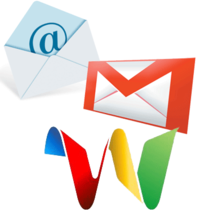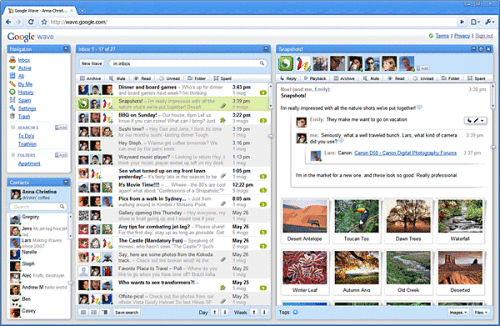An email sent in the early 1970s looked very similar to one sent on the Internet today. (Wikipedia)
 Hmm sad, isn't it? Over 30 years and there's little change in the way people communicate online. Now of course, technology has changed, now there can be attachments and html however, it's still the same boring message. What email lacks is fluidity. People can create software and applications that allow users to organize their emails but the messages are still fundamentally separate messages.
Hmm sad, isn't it? Over 30 years and there's little change in the way people communicate online. Now of course, technology has changed, now there can be attachments and html however, it's still the same boring message. What email lacks is fluidity. People can create software and applications that allow users to organize their emails but the messages are still fundamentally separate messages.
In 2004, Google privately launched their widely popular email service Gmail. The goal of the project, still in beta to this day, was to change the way we email. Emails were formed into conversations allowing for easy separation of messaging. Another key aspect to the service was the near endless amount of space, you should, "never have to delete a message!" Five years later and I have over 25,000 emails archived, easily searchable instantly. This is great, yet I may be emailing other people, who do not have gmail or who do not understand the whole conversation format.
This is where Wave comes in. As they said, "Wave is email if it were created today." Now I'll admit, wave is a tricky thing to explain. Let's imagine you're in a classroom back in the wee days. Your teacher says, "Go write your goals for the year on the baord," and follows up by asking three other members of class to do the same thing. The teacher walks to the board and corrects spelling and grammar on your goals. Imagine this blackboard as an interactive email message. You can post "waves" aka content (like an email message) and send it to multiple people. These people can message the whole "wave" about the content or even make changes to your content. These are instantly visible to you and everyone whether they are online at their computer or not (when I say instant, I mean you will see their cursor change the content, as you saw the teacher in the classroom correct spelling). The teacher calls on your friend Billy to write his goals on the board however Billy doesn't want to do so. You lean over to Billy and ask his goals, he tells you he wants to work on his reading but he doesn't want everyone in the class to know. This knowledge is only shared between you and him, yet is part of the whole grad scheme of the class, although the teacher nor the rest of the class know this. This is another great feature of Wave, users can create side conversations within a wave that is not necessarily shared by the entire group, yet in your version it will appear no different, forever.

Now, in a day where Social Media is a buzz word, members of generation Y who are looking to get into any socially oriented business will use tools such as this to better communication. The executive board for MEISA at Northeastern University connect with email to remind each other of deadlines and things we must accomplish to succeed in the world. Many of us use Gmail to help with the mass confusion however we have no real way to share the same information, visible to us all at the same time with each other's ideas and edits.
In a day where Tweets are an instant way to share information, everything is getting faster and more live. With Wave, the future is in your browser. Should we say goodbye to email? Will the digital form of communication phase out as it did with the cassette tape and 8 tracks? First of all, a few decisions still need to be made before these questions will be answered. Will Wave users be able to communicate with Email users? Will there be a cross over, as gmail converts emails into conversations? There is a fine balance between opening up for email and still drawing people to use the protocol.
People will always doubt technology but I feel as though the team behind wave has spent quite long designing the fundamentals of the system. Of course, it's not open to the public yet and I'm sure many more questions will be answered prior to the opening. One things for sure, to a new generation just starting to use Email, this will be a welcome and a change, if executed correctly, that could change the basis of communications forever.